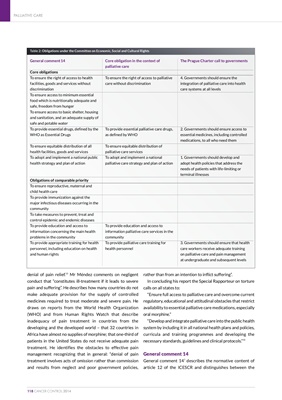
PALLIATIVE CARE
CANCER CONTROL 2014 119
right to health and the right to be healthy. Article 12 speaks
of the right to the attainable standard of health taking into
account a person's "biological and socioeconomic
preconditions and a State's available resources". This relates
closely to the palliative care concept of best possible quality
of life while living with a life-threatening or life-limiting
illness such as cancer.
General comment 14 also describes four essential
elements to the right to health. These are availability,
accessibility, acceptability and quality. What do the four
elements mean in the context of palliative care?
Availability
Palliative care should be available in sufficient quantities
within a country's public health facilities and other health
care facilities including children's homes and care homes for
the elderly. This includes health care professionals and other
health care workers trained in palliative care and availability
of essential palliative care medicines. It should be integrated
into mainstream health care so that psychosocial support and
symptom control are available from the time of diagnosis.
Accessibility
General comment 14 describes accessibility in terms of "four
overlapping dimensions" - non-discrimination, physical
accessibility, economic accessibility (affordability) and
information accessibility. Palliative care should be accessible
for all people without discrimination; including minority
groups, to prisoners and other marginalized populations. It
should be available to children, to older people, to people
with disabilities, to people living with HIV. Palliative care
should be physically accessible in a country. If patients choose
to stay at home, there should be home care services that
provide quality palliative care in the home. Palliative care
should be available in health care facilities, and in
communities. In some countries non-governmental
organizations (NGOs) provide palliative care in a patient's
home. Palliative care should be available in rural areas.
There is uncertain funding of palliative care services. In
some countries palliative care is fully funded by the state and
NGOs also receive state funding. In many developing
countries palliative care is funded through donations from
communities or corporate donations with little contribution
from the state. Patients requiring palliative care are often not
medically fit to work and if they do not have medical
insurance, they are not able to pay for palliative care services.
In many countries hospices provide palliative care free of
charge to patients and rely on donations to be able to fund
the services.
Patients and their families should have sufficient access to
information about palliative care services and the option of
palliative care. Ideally, palliative care should be a wellpublicized service within communities. Patients
with cancer
should receive the information from their doctors so that
palliative care would go hand in hand with definitive
treatment and would be available for support at any stage of
the illness. Currently, the discussion about including palliative
care is often delayed until late in the course of the illness.
Acceptability
Palliative care services should be respectful of medical ethics
and, indeed, palliative care training includes strong emphasis
on bio-ethics as there are often challenging decisions to be
made about end-of-life care. Palliative care services should
be respectful of culture, gender and age; respecting
confidentiality and aiming to improve quality of life of
patients and family members.
Quality
Health facilities, goods and services must also be scientifically
and medically appropriate and of good quality. They should
follow minimum standards that are appropriate to the
individual country's resources.
General comment 14 also describes that the right to health
for older persons should include measures "aimed at
maintaining the functionality and autonomy of older persons;
and attention and care for chronically and terminally ill
persons, sparing them avoidable pain and enabling them to
die with dignity".7 There should be the same recognition of
needs of children, adolescents and younger adults when
faced with life-threatening and life-limiting illness.
The Committee on Economic, Social and Cultural Rights
describes "core obligations" and "obligations of comparable
priority". These are summarized in Table 2 and relevance to
palliative care summarized as well as the call to governments
included in the Prague Charter. The concept of core
obligations has not been universally accepted. Many
governments have rejected the core obligations approach
while still embracing socioeconomic rights and the concept of
progressive realization of these rights. So while describing the
core obligation set out in General comment 14, we recognize
that this may not be the approach to implementation of the
rights described in IESCR taken by many governments. For
example, the South African Constitutional Court in the
landmark Treatment Action Campaign case (2002) recognized
that the South African government could not meet all basic
needs but ruled that the government's obligation nonetheless
is to seek to meet these needs, acting reasonably to provide